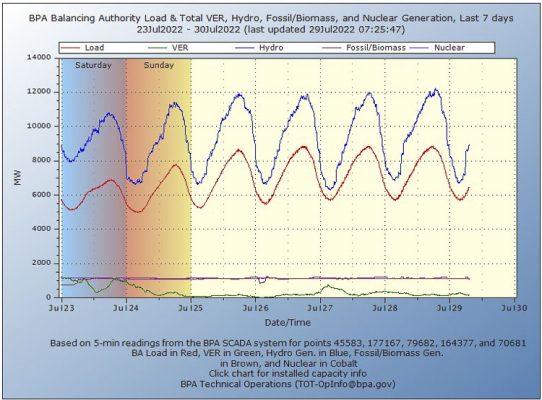
Todd Myers of the Washington Policy Center discusses the belief that we can meet future energy needs with more wind power
Todd Myers
Washington Policy Center
The last week of July was the hottest of the year in Washington state and demand for electricity jumped to its highest level in the BPA region since March 10. Simultaneously, wind-generated electricity fell to nearly zero across Idaho, Oregon, and Washington. It is a good example of why wind power is a poor substitute for hydroelectric power. Energy that disappears when it is needed most is simply not sustainable.

During a four-day period July 25-28, wind and solar power across the entire region generated between 150 and 270 megawatts (MW) during peak demand hours in the early evening. That is only 2 percent of total generation and about the same as just one of the four Lower Snake River dams.
This isn’t rare.
Between January 25 and 28, when peak demand was over 9,000 MW every morning, total wind and solar generation provided between zero and 0.3 percent of total energy demanded. And when the BPA region had its highest demand of the year on February 23, reaching 10,422 MW, wind and solar accounted for less than 1 percent of energy used by customers across the Northwest.
When demand for electricity is greatest – due to hot or cold weather – too often, wind disappears.
The only meaningful amount of wind occurred just after midnight on the morning of July 27 when demand for electricity was at the lowest point of the day. As demand increased, the wind died down.
There are some who believe we can meet future energy needs with more wind power. Some argue we can replace hydro, which can be turned on when demand increases, with wind and solar. The experience of this week and earlier this year demonstrate that when wind is needed most, it is unreliable.
Todd Myers is the director of the Center for the Environment for the Washington Policy Center.
Also read:
- POLL: Should fireworks be banned in unincorporated Clark County?Should fireworks be banned in unincorporated Clark County?
- Opinion: ‘I am absolutely disgusted by lawmakers and educators who have been successful in reducing parental rights’Clark County Today Editor Ken Vance voices concern over recent changes to parental rights legislation in Washington state and urges support for education alternatives.
- Letter: ‘Objectivity to scientific decision-making should be present in government officials’Vancouver resident Michael Glynn questions Clark County’s scientific objectivity in development decisions near a bald eagle nest.
- Opinion: Governor Ferguson signs the largest tax increase in Washington’s history into lawMark Harmsworth critiques Washington’s new budget, calling it the largest tax increase in state history and warning that its burdens on businesses and consumers outweigh the benefits.
- Opinion: Work? Strike? Whatever; Employers now required to pay union members not to workA new Washington law allows striking workers to collect unemployment benefits, a move Elizabeth New argues will unfairly burden employers and encourage more frequent and prolonged strikes.










